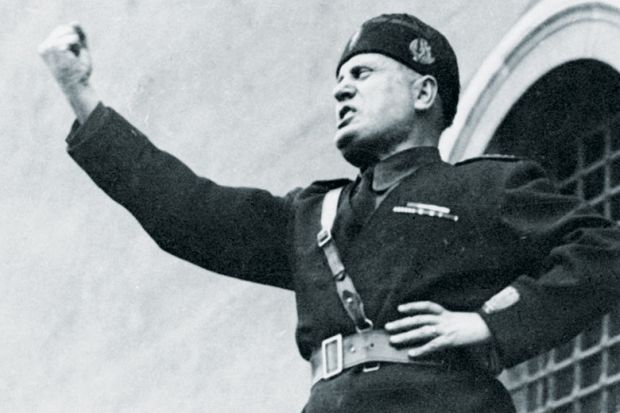To anyone familiar with accounts of European Jewish history under Fascism, the approach taken by Patrizia Guarnieri in this meticulously researched book will seem unusual. Unlike other histories of the Jews during this period, her account centres on a specific academic context. Although very revealing in many ways, this viewpoint can also be restrictive.
Looking specifically at the psychology faculty of the University of Florence, Guarnieri shows how the discipline was in effect bullied into submission, first by a group of influential neo-idealists who were virulently hostile to the human sciences, and then later by Fascists. What is chilling is that the two are connected; as Guarnieri demonstrates, several of the neo-idealists became Fascists, most notably Giovanni Gentile, a professor of philosophy who became Mussolini’s minister for education. The combined forces of neo-idealism and Fascism would sound the death knell for Italian psychology, which dwindled from lack of government support during this period. However, it was only in 1938 with the onset of anti-Semitic legislation that “the creeping fascistization” of Italian academia became a race issue.
In contrast to the evocative photo on the book’s cover depicting a battered suitcase in shadow and the lower half of an unknown person, Guarnieri’s treatment of the impact of anti-Semitic measures in Italian universities is noticeably detached, presenting it more as an inconvenience for the scholars concerned than a devastating and humiliating expulsion. The book’s two principal case studies – those of Enzo Bonaventura and Renata Calabresi – chronicle very precisely how these two Jewish academics, who would be banned from their place of work, found employment abroad with the help of an extensive network of contacts. It is interesting, if perhaps not surprising, that despite their status as persecuted refugees they still had to compete for jobs with other scholars in the same position. A chapter on Bonaventura devotes three pages to the shortlisting process for the chair of psychology at the Hebrew University of Jerusalem to which he was eventually appointed. The chapter concerning Calabresi outlines, over eight pages, her application process for work in the US and the UK, including copious requests for references and questionnaires and extracts from various pieces of correspondence.
In both cases, the focus on the overwhelming minutiae of professional and financial survival overrides the immediate political context. In keeping with this tendency, the chapters on Bonaventura and Calabresi move very swiftly through the 1930s to 1943 when, following the fall of Mussolini, Italy began the process of Jewish reparations. There is indication that Bonaventura would have liked to return, while Calabresi categorically refused; in any case, neither was encouraged by their respective academic institutions. Furthermore, as Guarnieri demonstrates, Italian academic history has since revised the biographies of these scholars and countless others, by minimising the role of Fascism in their decision to emigrate and asserting that other factors such as career opportunities were more significant.
Possibly the most curious thing about Guarnieri’s study is that it approaches such a large subject through such a narrow lens. In its exhaustive accounts of promotions, demotions, back-stabbing and nepotism, the question of Italian anti-Semitism is somewhat obscured. Anyone who does not have a working interest in the intricacies of Italian university politics may find its focus too limited.
Giulia Miller is affiliated lecturer in modern Hebrew, University of Cambridge.
Italian Psychology and Jewish Emigration under Fascism: From Florence to Jerusalem and New York
By Patrizia Guarnieri
Palgrave Macmillan, 304pp, £63.00
ISBN 9781137306555 and 6562 (e-book)
Published 6 January 2016
POSTSCRIPT:
Print headline: Stabbed in the front
Register to continue
Why register?
- Registration is free and only takes a moment
- Once registered, you can read 3 articles a month
- Sign up for our newsletter
Subscribe
Or subscribe for unlimited access to:
- Unlimited access to news, views, insights & reviews
- Digital editions
- Digital access to THE’s university and college rankings analysis
Already registered or a current subscriber?




